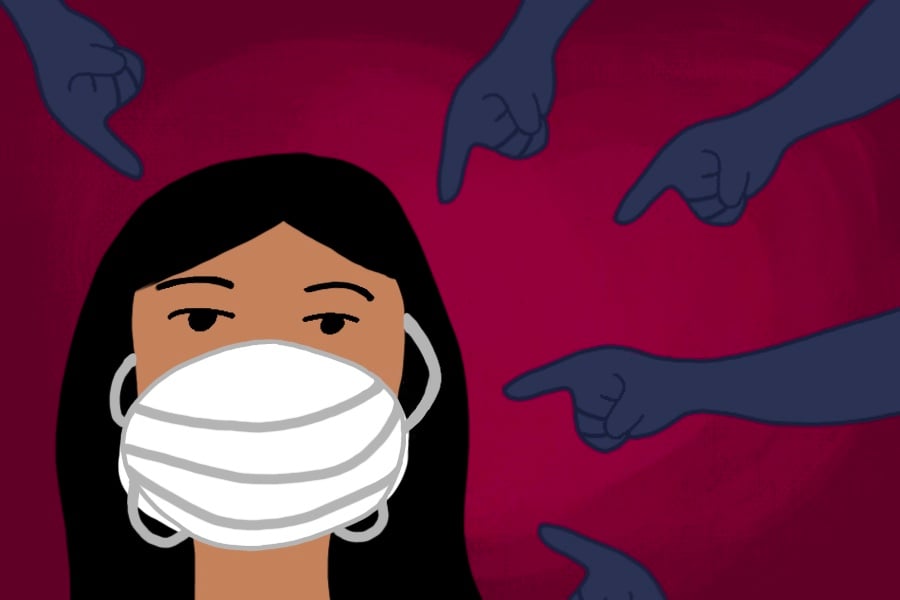Graffiti, handshakes and the “perpetual foreigner”: Asian Americans at Northwestern report alienation amid COVID-19
Illustration by Catherine Buchaniec
With the spread of coronavirus has come increased levels of racism directed toward Asian Pacific Islander Desi Americans.
April 22, 2020
Soo La Kim was walking on the Lakefill with her two young children when she arrived at a rock painted with a Chinese character and the name, “Kurt Pei.”
Overlapping the original paint, she said, were the words, “Chinese virus,” underlined three times.
“My first reaction was anger that someone would take the time to come onto campus to write that specifically on a rock that someone who identifies as Chinese had painted,” Kim said. “It seemed very deliberate and very pointed after racism and aggression. So yeah, it made me angry.”
Kim, who is the assistant dean of graduate programs at NU, said she wanted her kids to recognize it was a racist act. She took a photo of the graffiti and reported it to Northwestern’s COVID-19 email address, and after the weekend, she found it was blacked out with paint.
While finding the graffiti did not make Kim feel personally in danger, she said she now feels more wary when she goes outside. But the words also contribute to the “perpetual foreigner myth” that Asian Pacific Islander Desi Americans come from across the ocean, regardless of their place of birth and upbringing.
In an April 1 Washington Post op-ed, former presidential candidate Andrew Yang wrote that people are “wired” to make assumptions based on race. In order to be part of “the cure” to the COVID-19 pandemic, he wrote, Asian Americans needed to prove their “Americanness” — that is, by wearing “red, white and blue.”
Kim, however, approaches this notion with caution.
“As if we can’t simply be American already in our identities, and that we have to somehow go out of our way to prove our Americanness,” Kim said, “I think that’s very dangerous.”
In January, Medill junior Michael Zhou competed in downtown Chicago with his mock trial team, where he is the only Asian American. After a trial ends, he said, students from opposing schools usually shake hands to congratulate each other on the round.
When Zhou extended his hand to another student from a rivaling school, he said the student refused to shake his hand but instead gave him a fist bump, citing the coronavirus. Zhou said he didn’t register it as a racial microaggression at the time, but made eye contact with his teammate.
Zhou was born in Montreal to parents who are both first-generation Chinese immigrants. He was raised in upstate New York.
“I haven’t experienced something as clear cut and dry as this before,” he said. “It’s just so disheartening for people, no matter who, to single out Asian Americans as the culprit.”
Zhou added that many other Asian Americans face more extreme discrimination in light of the pandemic. And the rate of hate crimes against APIDA has certainly increased.
In early April, a woman taking out her trash in Brooklyn, New York was attacked with acid. A 19-year-old in Texas stabbed three Asian American family members, including two young children. A report by the Asian Pacific Policy and Planning Council revealed that it has received over 1,500 accounts of coronavirus-related discrimination since March 19.
The conflation of the virus to Asian Americans is not unknown to the campus community. In its January 30 session, Associated Student Government released a statement recognizing that one of its members had posted a meme in its private communication system depicting Black Plague doctors alongside references to Asians.
The University also continues to collect reports of racist incidents through the Office of Equity and Office of Institutional Diversity and Inclusion. Some faculty are trying to find ways to discuss the virus’ impact on the APIDA community by incorporating the topic into their courses.
Asian American Studies professor Shalini Shankar teaches a Spring Quarter course called Language in Asian America, which examines how members of the APIDA community are “racialized through language.”
In the time of the coronavirus, Shankar said, she adjusted the course to include “Chinese virus” and further study the revival of anti-Asian slurs. In the next class, she said, her students will talk about how Joe Biden’s recent campaign advertisement perpetuates the alienation of the Asian American identity.
Shankar said she told students they can come to her about racist discrimination and that so far, no students have revealed they have experienced such incidents. But with the 40-some students scattered across the greater United States and the globe, she said she often worries about her students and colleagues.
“One of the really damaging (ways) the virus is being discussed is ‘the Chinese problem,’” Shankar said. “It’s just the complete sense of us-and-them that doesn’t take into account how Chinese Americans and people who are mistaken for Chinese Americans have been in this country, in many cases, for centuries.”
Email: yunkyokim2022@u.northwestern.edu
Twitter: @yunkyomoonk
Related Stories:
—As COVID-19 spreads, Evanston residents encounter anti-Asian racism



